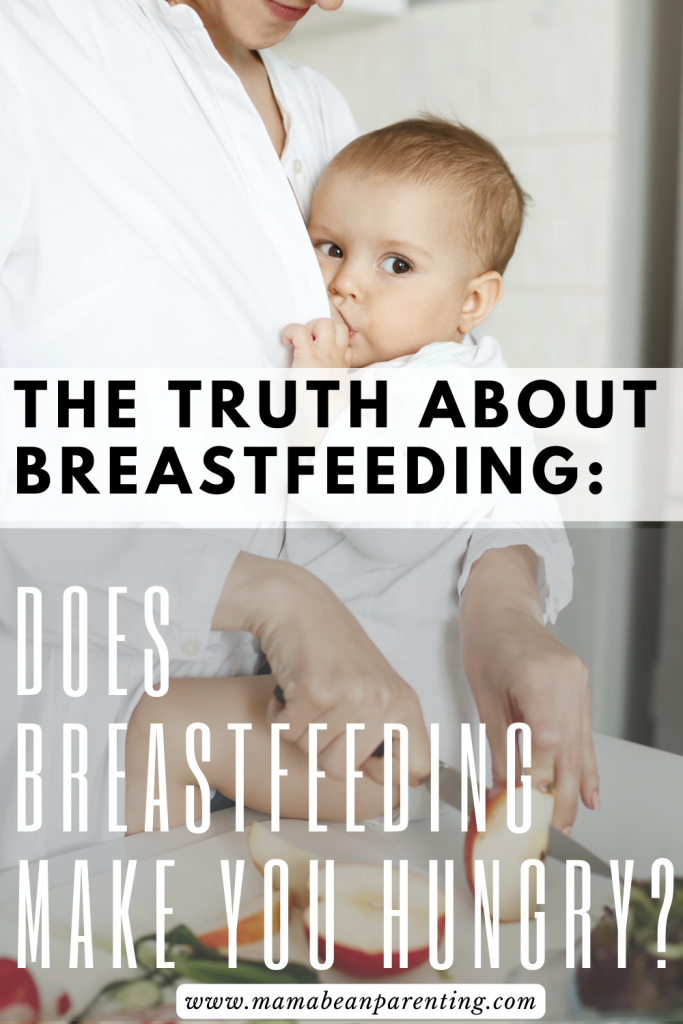Does breastfeeding make you hungry?
Well, it does.
The answer to that question is quite simple.
The energy required to create milk alone uses around 500 calories each day.
Coupled with sleep deprivation, which we already know drives us towards high-sugar, high-carb comfort food, it’s inevitable that breastfeeding mums will get hungrier than ever.
Why Might You Feel Constantly Hungry While Breastfeeding?

Surely you have heard that breastfeeding helps lose weight since many calories are consumed while breastfeeding, but you wonder why does breastfeeding make you hungry.
Now that you’ve been breastfeeding your baby for some time, you’ve been feeling hungry all the time. You just can’t stop wondering if this is your case or if every other woman has the same experience.
First, you should not worry since it is normal to be more hungry during lactation, especially in the first weeks since the body is recovering from childbirth.
It has to adapt to lactation, and, in addition, feedings are more frequent. All this makes the organism demand more food to cover its caloric needs to produce milk without problems.
Thus, experts indicate that a lactating woman has to consume 20% more calories per day than one who is not breastfeeding.
Breastfeeding produces a significant expenditure of energy, so it is normal for you to have more feelings of hunger to meet those extra-calorie needs.
In addition, when breastfeeding, a hormone called oxytocin is produced, which works as a neurotransmitter, providing a feeling of well-being to the mother but also awakening her appetite and making her feel more hungry.
Likewise, oxytocin favors digestion and helps to make the most of nutrient intake.
For all these reasons, you can see why does breastfeeding make you hungry.
Similarly, the sensation of thirst increases, especially in the first days, so you should always have a bottle of water on hand to drink about 2.5 liters of water a day while breastfeeding.
How To Deprive Hunger While Breastfeeding?

Here are some ways to help breastfeeding mothers help control their hunger aches:
1. Limit your sugar intake
Sugar has empty calories and no nutrients at all.
So, why have something which doesn’t benefit you at all?
This is a myth that consuming more sugar will increase the milk supply, and please don’t fall for it. Instead, satisfy your sugar cravings by having fruits.
2. Relax, and no need to hurry
One must understand that one cannot fit into pre-pregnancy clothes with a snap of a finger.
It takes nine months to gain that weight, so at least give six weeks for the organs to return to their original size and shape.
The kid needs a mother more now, so it’s the perfect time to focus more on that and stop questioning why does breastfeeding make you hungry.
3. Time management
This is the most crucial part.
It’s challenging to stick to a definite eating pattern or schedule while managing a little infant with no fixed sleep time. So, it’s always better to write down things and manage the time accordingly.
Writing down a plan always helps. If not 100 %, even if 50% of it is followed, it can do wonders.
Make a list of healthy snacking options.
Maintain the prepared food and keep it in the refrigerator for easy access.
Ask for help from family members/hire help for the care of the baby while giving time to own self. Try a simple workout like walking out with the baby in a stroller or a baby carrier.
4. Make intelligent food choices
When hunger ache strikes, instead of curbing it with biscuits/chips or other processed items, choose to have fruit, vegetables, or anything homemade.
Rather than having four chapatis and just a bowl of vegetables, replace it with two chapatis, more bowl of veggies, curd, and salad.
5. Increase the intake of water/fluids
Not only will this wash off the toxins, but it will also help increase the milk supply.
6. Requirement of nutrients, not calories
A study has proved that a pregnant or a new mother doesn’t need to eat for two. There is only a requirement to add 300-350 extra calories than the BMR to accommodate the baby.
So, don’t fall into the trap of old-age advice that a breastfeeding mom needs to eat for two.
Eat a diet rich in iron, calcium, protein, Omega 3s, and more complex carbohydrates, and take your supplements on time.
7. Eat consistently throughout the day
In the case of breastfeeding moms, eating frequent and small meals really helps a lot.
Research suggests that mothers who keep a vast gap between their meals while breastfeeding & tends to diet loses their milk supply.
It may also lead to a decrease in insulin production and a rise in thyroid levels as at the time of breastfeeding body is already burning extra calories on its own for producing milk.
The body will pull energy from the stored reserves if there is a massive meal gap. So, don’t starve – eat.
8. Don’t compare yourself with celebrities and other mothers
Lastly, don’t compare yourself to celebrity mothers.
Everybody has a different lifestyle and a body that functions at its own pace.
Try enjoying this beautiful phase of motherhood, and don’t overburden yourself.
If you and your baby are healthy and happy, weight loss will automatically happen.
Focus more on health than on weight.
What Food to Avoid While Breastfeeding?

1. Liver
Liver and pâté can contain heavy metals and excessive amounts of vitamin E, so nursing mothers must avoid them.
2. Fried food
Fried food contains many harmful trans fatty acids, which should be avoided, especially during breastfeeding. In addition to fried food, margarine, puff pastry, puff pastry, etc., are not recommended in the diet of nursing mothers.
3. Eggs and nuts
Are you sure that avoiding certain foods (e.g., peanuts) will prevent the development of possible allergies in the infant? Unfortunately, there is no scientific basis for such procedures. By restricting yourself unnecessarily, you can only jeopardize the regular supply of your body with all the necessary nutrients.
4. Spicy food
Do you love spicy food? Most infants do not mind the spicy food that mom eats. However, if the child often has wind, colic, and diarrhea every time you add hot pepper to your lunch, give up very spicy and hot foods for a few weeks. Then, you will see if your baby’s digestive problems are related to that.
5. Sweet drinks
A nursing mother is usually (at least in the first months of breastfeeding) thirstier than usual because of the need for liquid increases during this period. Sweet drinks, thick fruit juices, nectars, iced teas, carbonated sweet drinks, and flavored water are not recommended. In addition to excessive sugar, they may also contain other additives that harm health. The most recommended drinks during breastfeeding are water and unsweetened herbal tea.
6. Mint, parsley, sage?
Spices give food a fuller taste that the infant will get used to. Various flavors and aromas of food pass into the mother’s milk, enabling the infant to get accustomed to different tastes early on. This means that already during breastfeeding, we can prepare the child for the successful introduction of solid food because children are most inclined to accept new tastes in the first months.
7. Coffee and cocoa
Drinks with added caffeine, cocoa, and energy drinks are not the right choice when breastfeeding. They usually contain a lot of sugar and, at the same time, harm the metabolism of some nutrients. Suppose a nursing mother cannot resist coffee and already drinks it during pregnancy. In that case, she can afford a maximum of two cups daily.
8. Alcohol
Nursing mothers should avoid alcoholic beverages (all types, including beer). The old belief that beer increases the amount of breast milk is wrong. It has been proven that alcohol passes into breast milk, which can adversely affect the infant’s development.
9. Mushrooms
Mom can eat them in smaller quantities if they are fresh, safe (if an experienced mushroom picker picked them), well cleaned, and if she does not eat them on an empty stomach (they are difficult to digest).
10. Food that puffs up
The main culprits for flatulence are beans, cabbage, broccoli, collard greens, and pears… so some moms avoid them entirely to prevent their babies from getting bloated. Such treatment has no scientific basis and limits the diversity of the mother’s and infant’s diet.
Is It Okay to Try to Lose Weight While Breastfeeding?

After giving birth, many mothers think about how to lose the excess weight gained during pregnancy and return to their pre-pregnancy weight.
If you are one of them, you may wonder if you can even start a reduction diet while breastfeeding your child.
The answer is: Yes!
Breastfeeding mothers are allowed to lose weight, but they must adhere to several important rules.
One of the rules is waiting to stay until your baby is at least two months old.
It’s best if you only do something intentional about trying to lose weight once your baby is two months old. Thus, your body will have enough time to “track” milk production and establish a balance between supply and demand.
If you start the diet too early, establishing breastfeeding can make it difficult. Remember that breastfeeding your child burns an average of 200-500 calories daily so you can lose 600 to 800 grams monthly.
While breastfeeding for more than two months, some mothers do not lose weight, and some even continue to gain weight.
In this case, you should increase your physical activity and reduce your food intake by approximately 100 calories per day.
Stop trying to find an answer to why does breastfeeding make you hungry and focus on playing with your baby.
Try breastfeeding on demand.
According to research, breastfeeding for longer than six months and frequent daily feedings are natural helpers in shedding extra pounds.
Eat at least 1500-1800 calories per day.
During breastfeeding, you should consume at least 1500 to 1800 calories daily, and only a few women will need slightly more calories than the stated average.
A diet with less than 1,500 calories per day is not recommended during breastfeeding, although a slightly lower calorie intake per day should not affect the flow and amount of milk.
Make sure that regardless of the limited calorie intake, the food you eat is rich in vitamins and minerals, especially calcium, zinc, magnesium, vitamin B6 and folic acid.
Maintain an average weight loss of 700 grams per week.
When your baby is two months old, you can start a diet that will help you lose up to 700g per week or about 2kg per month.
Such a diet should not affect either milk production or your baby’s weight gain. This weight loss rhythm also leads to the gradual release of toxins from spent fat deposits, and the child is not exposed to these harmful substances.
Reduce the number of calories gradually over a long period.
Too sudden reduction in the number of calories you eat through meals can cause a decrease in your milk supply.
It is assumed that too sudden a reduction in the number of calories leads the mother’s organism to starvation and “survival.”
Hence, the body reacts in such a way as to exclude “secondary activities” such as milk production.
Avoid “fast-track” diets.
Diets that promise to lose accumulated pounds in a short period, such as seven-day diets, are by no means recommended when breastfeeding.
This group includes low-carbohydrate diets, diets based on weight-loss drugs, and the like.
It is known that harmful substances from the environment, including dioxin and polychlorinated biphenyls, which the mother brings into the body through food, are deposited in her body in fatty stores.
Too rapid weight loss can lead to the release of harmful substances and their faster entry into the bloodstream, and it is believed that the concentration of toxic substances in breast milk increases for the same reason.
Regular daily exercise is a big help in effectively shedding extra pounds.
Regular exercise has a substantial positive effect on the overall psychophysical state of a person.
Some mothers worry whether their increased physical activity can affect the amount of milk, will change its taste as a result, and whether the baby may start refusing to breastfeed.
Studies show that exercise has no significant effect on the amount or composition of breast milk. Only a slight increase in lactic acid levels has been shown immediately after intense training at maximum intensity. But in most cases, this should not cause any problems with breastfeeding.
Conclusion

The bottom line is that breastfeeding increases your appetite, but so does pregnancy, and (for some) so does sleep deprivation.
The answer is to eat healthy snacks that you enjoy and include them as part of your overall lifestyle, not for a specific situation. Cutting calories won’t help you lose weight; it will just make you miserable.
If you’re breastfeeding and are concerned about the amount of weight you’ve gained, talk to a doctor or a lactation consultant about it—but don’t cut calories to try and solve the problem. There might be a chance that you are preggo again! In that case, you should learn everything about signs of ovulation while breastfeeding.
Just please, don’t make that your main concern. Take care of your mental health and your baby.
Everything else is easily solvable.


